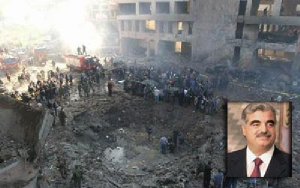
Like so many others before it and after, the earth-rattling car bomb that took the life of former Lebanese prime minister Rafiq al-Hariri on a downtown Beirut street in 2005 produced an endless stream of recrimination.
No sooner had the smoke cleared than accusations and counter-accusations began. International intrigue emerged. Catching the culprits soon seemed beside the point.
But the story of Hariri’s killing will take a highly unusual turn Thursday, one that sets it apart from all other recent violence in the Middle East.
In a suburban Dutch courthouse, far from the political and sectarian fault lines of Lebanon, an international tribunal will begin hearing evidence in the trial of four men who have been charged in absentia with Hariri’s murder.
For Hariri’s family and for prosecutors, it will be a rare and hard-won opportunity to seek justice in a court of law. Prosecutors say they have built an intricate case that uses cellphone records to tie the four men — all of whom are allegedly supporters of the militant Lebanese Shiite group Hezbollah — directly to the attack and subsequent cover-up.
They plan to call as many as 500 witnesses, including survivors and relatives of the victims, in a case that could stretch a year or more and has already cost of hundreds of millions of dollars.
“What the Special Tribunal for Lebanon is doing is sending a message of accountability, however small,” said Marten Youssef, the tribunal’s spokesman. “We’re responding to the Lebanese people’s desire for an end to impunity.”
But prosecutors also face a daunting challenge in trying to keep the trial separate from a political context that has only become more poisoned and violent in the nine years since Hariri’s killing.
As the Syrian civil war spills westward into Lebanon, tit-for-tat attacks in the streets of Beirut have become increasingly common, with one late last month claiming the life of a Hariri ally, former finance minister Mohamad Chatah.
The process of bringing the Hariri case to trial has been politicized from the start, with Hezbollah condemning the tribunal as an Israeli and Western conspiracy. Hezbollah, which is the dominant political player in Lebanon, denies any role in Hariri’s killing and has blamed it on Israel.
The group has vowed to block any attempt to apprehend the four defendants, whose whereabouts are unknown. A fifth suspect is being tried separately, also in absentia, making these the first international criminal trials since Nuremberg in which the defendants will not be present.
The reality that none of the defendants are likely to be punished, even if they are found guilty, is just one of many factors that makes the trial unusual. Another is the origin of the Special Tribunal for Lebanon, which was set up as a hybrid creation of the United Nations and the Lebanese government in 2009 — over Hezbollah’s vehement objections.
Hariri, a Sunni businessman who served two tours as prime minister in the 1990s and the early 2000s, was an implacable Hezbollah foe. Several leading figures in Lebanon’s pro-Western, anti-Hezbollah bloc, known as the March 14 Alliance, intend to attend the trial’s opening on Thursday. They include Hariri’s son Saad, who is also a former prime minister.
While March 14 has pushed for other assassinations and acts of violence to be included in the tribunal’s mandate — including Chatah’s murder — the focus has so far been limited largely to the Feb. 14, 2005, attack that killed Hariri and 22 others.
“The jurisdiction is focused on a specific incident. That’s not common for international tribunals, which usually deal with mass atrocities,” said Misa Zgonec-Rozej, an international law expert at the London-based Chatham House.
Hezbollah has pointed to that inconsistency as evidence the West is pursuing selective justice, prosecuting Hezbollah backers while ignoring attacks against the group’s Beirut strongholds that are widely believed to have been carried out by radical Sunni groups.
Julien Barnes-Dacey, a fellow at the European Council on Foreign Relations, said the trial is unlikely to have any moderating influence on Hezbollah’s behavior at a time when the group is fighting what it regards as an existential battle in both Syria and Lebanon.
“The trial is detached from the reality of what is happening on a day-to-day basis in Lebanon, which is that political violence continues, Hezbollah remains a major player and this legal process won’t be able to impose itself on the facts on the ground,” he said.
Even backers of the tribunal say they have limited expectations. They also acknowledge that it could stir up tensions in a country already perilously close to being consumed by the Syrian war next door.
“Will this have a transformational effect? No. Will it lead to short and medium-term complications? Yes,” said Emile Hokayem, a Middle East analyst with the International Institute for Strategic Studies.
But Hokayem said the potential benefits can’t be so easily dismissed in a country where the lack of accountability for past crimes often leads to future violence.
“All this needs to be weighed against the complaint that in Lebanon, no political crime is ever properly dealt with,” he said. “If you don’t have a trial, the signal you’re sending is that there’s no hope of justice.”
Washington Post

Leave a Reply
You must be logged in to post a comment.